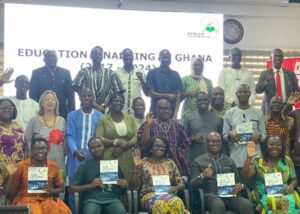…despite signing with international benchmarks that propose more
By Deborah Asantewaah SARFO
Africa Education Watch (Eduwatch), in a recent education financing tracker report, has revealed that despite the country being a signatory to international benchmarks which promise to commit a substantial amount of money to education financing, only four percent of its Gross Domestic Product (GDP) value was channelled to the education sector over the past seven years.
International benchmarks for education financing serve as guidelines to ensure that countries allocate the necessary resources to provide quality education for all.
Ghana is a signatory to United Nations Education Scientific and Cultural Organisation (UNESCO) guidelines that advocate commitment to allocating at least four percent to six percent of GDP or 15 percent to 20 percent of total government expenditure to education financing.
Again, government also signed onto the Global Partnership for Education (GPE): pledging to allocate at least 20 percent of the national budget to education.
However, available statistics indicate that for the past seven years (between 2017 and 2024), the average education sector share of GDP has been 3.92 percent; with the highest being 4.63 percent recorded for 2020 and lowest being 3.09 percent in 2023.

Over the same period, the sector’s average share of the national budget was 16.9 percent – with the highest being 20.76 percent and lowest 12.97 percent, recorded in 2019 and 2023 respectively.
The tracker, which assesses education budgeting and expenditure performance from 2017 to 2024, highlighted key trends, gaps, challenges and their implications for achieving Sustainable Development Goals (SDGs), and recommendations for improved resourcing of education in the country.
Senior Programme Officer-Eduwatch, Divine Kpe, in a presentation at the report launch said: “Our tracking from 2017 to 2024 tells us that, averagely, we are doing about four percent; which is the lower threshold of what is supposed to be committed, and in terms of annual commitment it’s around 17 percent”.
Furthermore, he provided a breakdown of main funding sources for the education sector: which include central government allocations, Annual Budget Funding Amount (ABFA), Ghana Education Trust Fund (GETFund), Internally Generated Funds (IGF), District Assembly Common Fund (DACF) and Donor Funding (DF).
In line with international conventions and best practices, domestic financing – which is seen as the most significant and sustainable source of education financing – contributed 96 percent of the sector’s budget over the 2017-2024 financial years, with the remaining four percent coming from external sources.
“Government contributed the largest share of sector expenditure over the period, with an accumulative share of 86.7 percent. The GoG contribution was 74 percent, followed by IGF at 11.3 percent, GETFund at 8.7 percent, ABFA at 3.7 percent, DACF at 0.2 percent and DF support at 2.1 percent.
Eduwatch urged government to upscale education spending to at least six percent and sustain it there, as this is crucial to ensuring quality education in the country.
He maintained that since the nation once allotted eight percent of its GDP to education, it is feasible to devote additional resources to this sector.
Another staggering finding from the report is how over-prioritisation of Free Senior Secondary Schools (FSHS) deprives the basic school level of adequate resources, leading to unequal distribution of resources at the various levels of education across the country.
The report further demonstrates this disparity in resources by referring to Eduwatch’s report on textbook tracking in 2023, which shows a regular budget for the provision of core textbooks to Free SHS while only 62 percent of the four textbooks required at primary level have been made available after four years of implementing the new Standard-Based Curriculum at primary level.
Mr. Kpe underscored a need to give more attention to special schools, where the money for feeding and budget credibility remains low.
The report was developed by Africa Education Watch (Eduwatch) with support from Oxfam and ActionAid.










